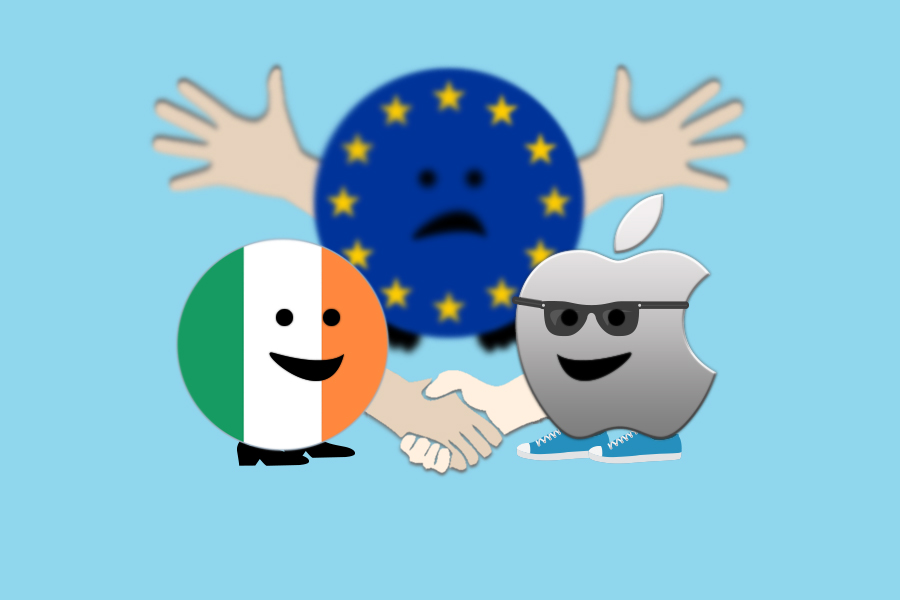
Apple, the EU, and Tax: What’s all the fuss about?
As most of you know, colossal corporations often face tax problems, and whether they’re deliberately avoiding tax or not is always a point of speculation and debate.
In recent news (as of a few days ago), Apple has been slapped with an undue tax bill by the European Union (EU), insisting that they pay more than €10 billion in back taxes to Ireland. Crazy, or not?
The EU states that giving tax benefits to selected companies is illegal under EU state aid rules, but Apple CEO, Tim Cook, says that the company “follows the law and pays all the taxes we owe”.
So, what’s the fuss about and why should we be worried?
The Story
It all started in 2003, when it was revealed that Ireland granted Apple tax benefits through an effective corporate tax rate that was 1%, and just 0.005% by 2014. Whereas, the usual rate of corporation tax in Ireland is 12.5%.
Now, after a three-year investigation, the EU is intervening the matter, stating that Apple owes Ireland unpaid taxes for over the past decade or so, worth €13 billion (about $19.3 billion AUD) — as well as interest.
The only confusing thing is that both Apple and Ireland are content with the tax situation, it’s that the EU thinks that it shouldn’t be allowed to happen. As a result, this ruling and both Apple and Ireland’s backlash response is likely to spark political tension between the US and the EU.
Both Apple and Ireland are readying separate appeals for the ruling to be overturned.
But, this leaves us with one question to discuss: should they pay or not?
They should pay!
Every business has to pay the fair amount, so should they.
Essentially, it’s unfair that Apple pays less tax, even if Ireland are happy for it to take place.
Apple has been in Ireland for over 30 years and has grown a workforce of over 60,000 workers there. Over the decades, Apple reached certain agreements with Ireland, and in exchange, Apple would create loads more jobs.
What the EU is also frustrated about is that Apple, because they pay a super-low tax rate in Ireland, have recorded all European sales in Ireland, rather than in the countries where the products were sold.
Again, Apple CEO, Tim Cook, has said that the company “follows the law and pays all the taxes we owe”, so this brings up the question of, although it is seemingly unfair for other businesses, is it technically illegal?
Regardless, the ruling is an important attempt at reducing the power that large multinational corporations have in avoiding tax liabilities and sends a warning to countries that facilitate corporate tax minimisation strategies.
They’ve got money coming out of their ears.
Apple seemingly has a mountain range made of cash and securities, worth more than $230 billion US (just over $300 billion AUD), held mostly outside of the US, so as to circumvent the high 35% US corporate tax rate.
So, basically, they’re more than capable to pay the €13 billion ($14.5 billion US), it would really be a dent in their cash balance, but there’s more to it — the principle of the matter.
They don’t have to pay!
The EU is stepping in on something that isn’t necessarily their direct concern.
So, we have Apple, Ireland, and the EU. Apple and Ireland have had their agreement over the past few decades, and now the EU wants to step in to call it illegal and make sure what happens is the right thing. In conclusion, the EU is creating more problems than solving them.
Ireland wants to keep their strong reputation as an attractive and stable location for long-term investment and a low-tax base for overseas companies.
Apple has also warned that the decision would cause issues revolving around investment and job creation in Europe. Cook has stated that “using the commission’s [EU] theory, every company in Ireland and across Europe is suddenly at risk of being subjected to taxes under laws that never existed.”
It’s the principle of the matter.
In its essence, the matter is about principle. Cook has proclaimed, “we never asked for, nor did we receive, any special deals. We now find ourselves in the unusual position of being ordered to retroactively pay additional taxes to a government that says we don’t owe them any more than we’ve already paid.”
On top of this, if the supposed agreement is that Apple gives Ireland an increasing amount of jobs and business in exchange for a lower corporate tax rate, then aren’t Apple essentially paying Ireland by giving them a helping hand with their economy and employment rate, among other economic benefits?
Conclusion
One side wants fairness (for others) and seemingly, freedom from corporate tax oppression in Europe, as Toby Quantrill, Christian Aid’s principal adviser on economic justice, says, “this is not a one-off situation – it is part of a damaging race to the bottom in which governments are competing on who can offer multinationals the lowest tax bill. It’s time to get multinationals’ tax affairs out in the open, so we can all see how much they are actually contributing to the rest of society.”
The other side wants fairness (for themselves) and seemingly, freedom from an unnecessary corporate tax issue, as Apple states that they’re not breaking any law, paying all of their due taxes, as well as being deliberately targeted by the EU with “laws that never existed”.
So, there really is no conclusion until something is settled between all parties involved. What do you think?
